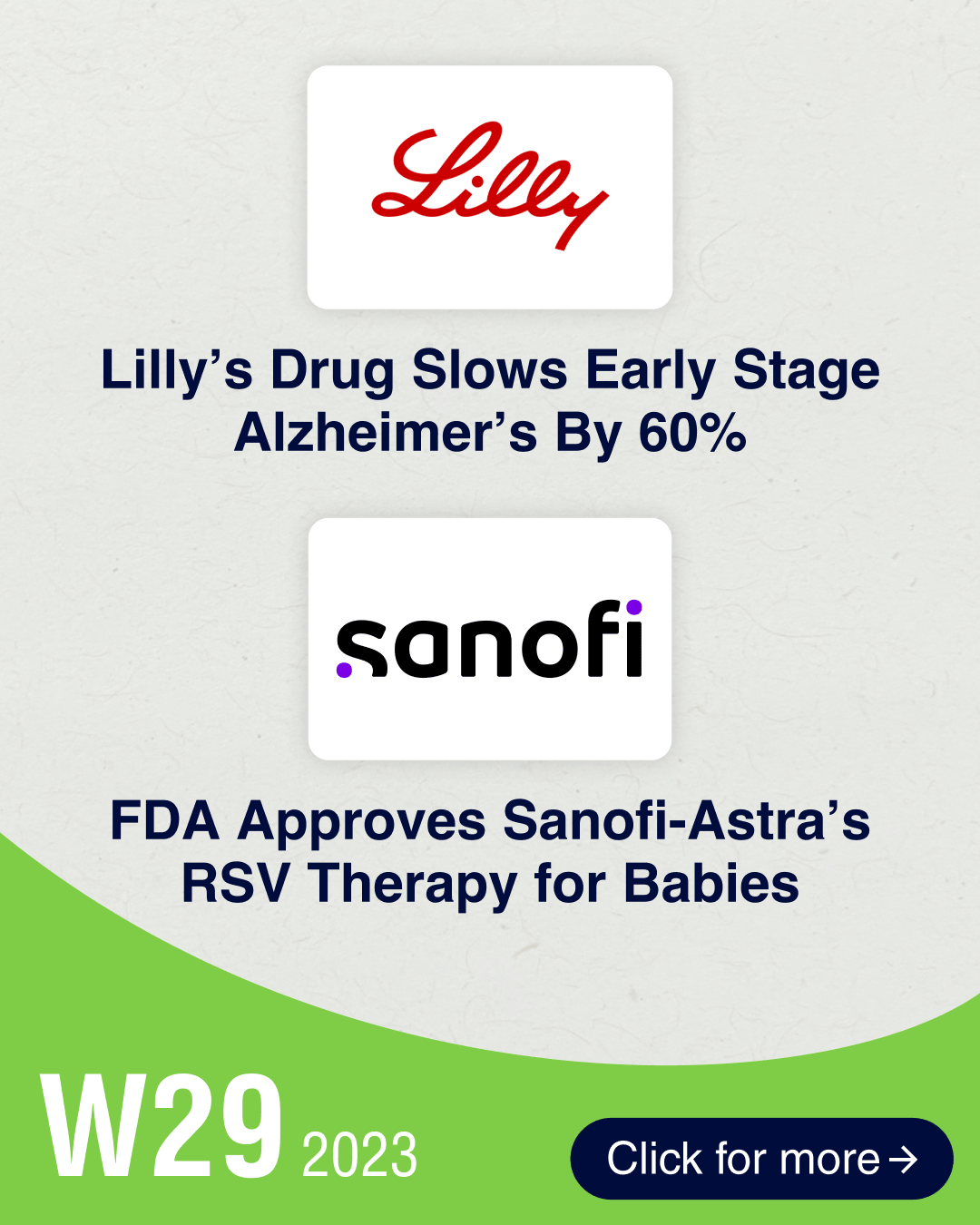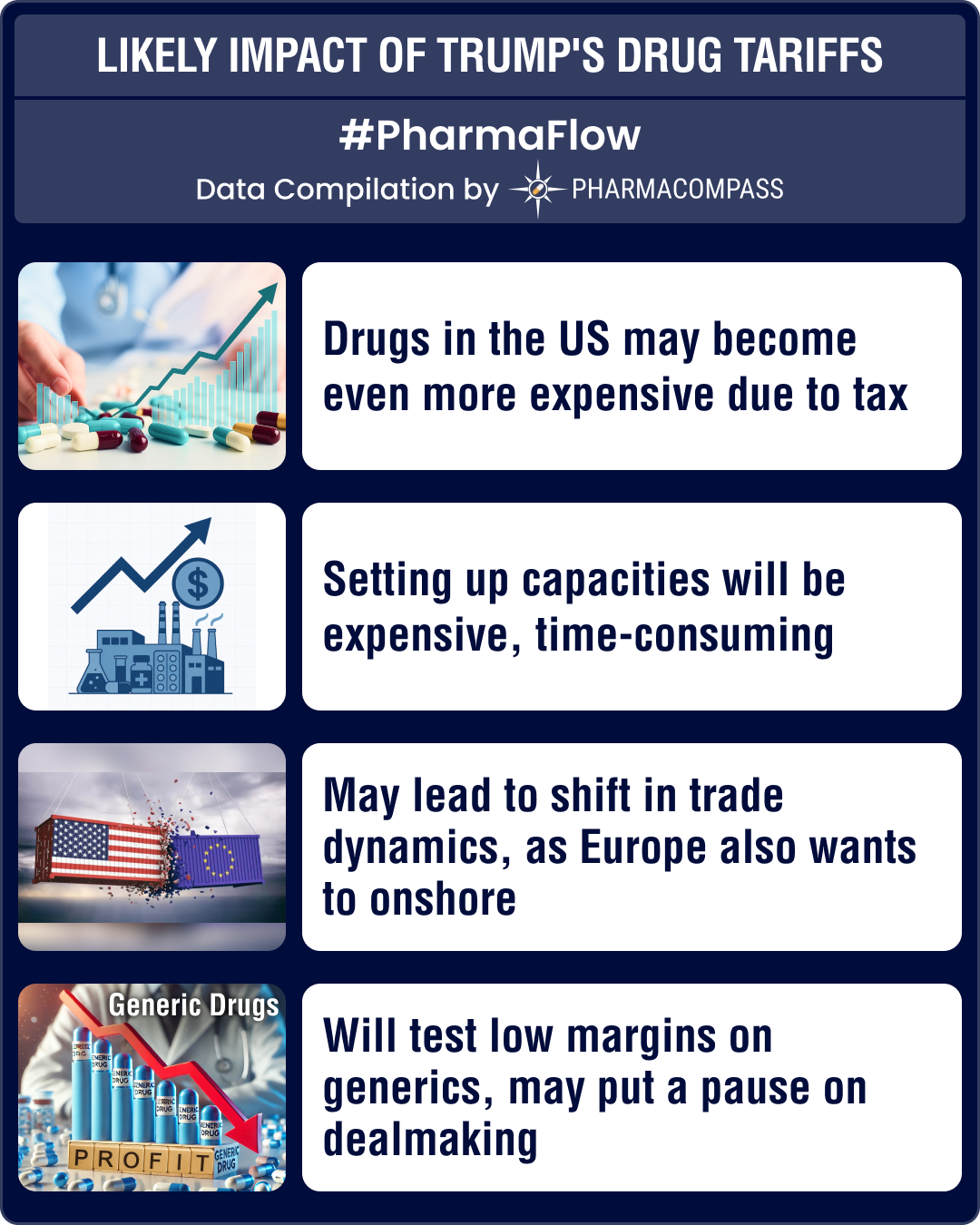
By PharmaCompass
2023-07-20
Impressions: 1,360 (Article) || 2 (Video)
Last week, Biogen-Eisai’s Leqembi became the first med for Alzheimer’s to bag FDA’s full approval. And this week, there is news that Eli Lilly’s Alzheimer’s drug, donanemab, has shown greater benefit in earlier stages of Alzheimer’s disease in a late-stage trial.
The US Food and Drug Administration (FDA) has granted approval to Sanofi-AstraZeneca’s respiratory syncytial virus (RSV) antibody therapy, Beyfortus (nirsevimab-alip), for newborns and infants.
In deals, Eli Lilly acquired New York-headquartered biopharma Versanis for a potential US$ 1.93 billion to boost its weight-loss portfolio. And Roche is reportedly in talks with Roivant to buy its bowel disease treatment for over US$ 7 billion.
In regulatory news, new draft guidelines on merger and acquisitions were unveiled in the US to draw up a tougher framework on mergers and acquisitions. And FDA has issued Form 483 to Indian drugmaker Gland Pharma for violations at its Dundigal facility in Hyderabad, India.
In news from clinical trials, BridgeBio’s experimental heart drug — acoramidis —demonstrated significant effectiveness in a late-stage trial for transthyretin amyloid cardiomyopathy, a rare heart disease. And results from early stage Alzheimer’s trials on Alnylam’s RNAi therapy and Acumen’s experimental drug have shown promising results.
Lilly’s donanemab slows early stage Alzheimer’s by 60% for mildly impaired patients
This fortnight, there has been a lot of news on Alzheimer’s drugs. Last week, Biogen-Eisai’s Leqembi became the first med for Alzheimer’s to bag FDA’s full approval. And this week, there is news from a late-stage trial on Eli Lilly’s donanemab — the med has shown significant reduction in cognitive and functional decline in early symptomatic Alzheimer’s disease patients.
Donanemab slows progression of memory and thinking problems by about a third, but that rate doubles to 60 percent if the drug is started when patients are only mildly impaired.
Lilly has submitted its application for full approval to the FDA and expects regulatory action by the year-end. Submissions to other global regulatory bodies are currently in progress and are likely to be finalized by the year-end. Like Biogen-Eisai’s Leqembi, donanemab is an intravenous antibody targeting beta amyloid protein in Alzheimer’s patients’ brains.
Promising results for Alnylam’s RNAi therapy: Alnylam Pharmaceuticals has shared promising early-stage findings for ALN-APP (amyloid precursor protein), the first experimental RNAi therapy designed to silence genes in the human brain. ALN-APP has demonstrated rapid and sustained reduction in amyloid precursor protein levels in the cerebrospinal fluid, indicating effective targeting. ALN-APP has been developed by Alnylam in collaboration with Regeneron Pharmaceuticals. Meanwhile, Acumen Pharmaceuticals’ ACU193, an experimental Alzheimer's drug, has also shown compelling safety profile in an early-stage trial.
FDA approves Sanofi-AstraZeneca’s RSV therapy for newborns, infants
Sanofi-AstraZeneca’s respiratory syncytial virus (RSV) antibody therapy, Beyfortus (nirsevimab-alip), has received approval from the FDA. It is a long-acting treatment that can be given once per season. The approval is specifically developed for newborns and infants and is given before or during their first RSV season. It can also be given to children up to 24 months who remain vulnerable to severe RSV disease through their second RSV season.
Opill now an OTC birth control pill in US: Opill (norgestrel), Perrigo’s oral contraceptive pill, has bagged FDA approval and will be available over the counter (OTC) in the US. This makes Opill the first daily non-prescription contraceptive pill available in the US for all ages.
Lilly to buy Versanis for US$ 1.93 billion to boost weight-loss portfolio
Eli Lilly has bolstered its weight-loss portfolio with the acquisition of New York-headquartered biopharma Versanis for a potential value of US$ 1.93 billion. Through this deal, Lilly will get access to Versanis’ lead asset, bimagrumab, an experimental obesity drug currently being assessed in mid-stage study alone and in combination with semaglutide, a rival Novo Nordisk weight-loss treatment marketed as Wegovy and Ozempic. Bimagrumab is a monoclonal antibody that acts directly on fat cells without reducing appetite and without prompting loss of lean mass.
Roche in talks to buy Roivant’s bowel disease treatment for over US$ 7 bn, says WSJ
A report in the Wall Street Journal says Roche is nearing a deal worth over US$ 7 billion to acquire RVT-3101, an experimental bowel disease treatment developed by Roivant Sciences focused on addressing conditions such as ulcerative colitis and Crohn’s disease.
Europe declines authorization to Ipsen’s drug to treat rare genetic muscle disorder
The European Commission has followed guidance provided by the Committee for Medicinal Products for Human Use (CHMP) in May this year, and has not granted marketing authorization for palovarotene, an investigational treatment for fibrodysplasia ossificans progressiva (FOP). Ipsen’s Palovarotene is the first treatment to be submitted anywhere in the world for regulatory approval for FOP, an ultra-rare disease with approximately 900 known cases worldwide.
BridgeBio’s heart drug meets study goal: BridgeBio Pharma’s acoramidis, an experimental drug, has demonstrated significant effectiveness in a late-stage trial for transthyretin amyloid cardiomyopathy. The drug showed an 81 percent improvement in patient survival compared to a placebo and presented a 92 percent improvement on heart failure tests. BridgeBio plans to seek regulatory approval from the FDA by 2023-end.
FTC unveils new draft guidelines, implies tougher stance on pharma M&As
In the US, the Federal Trade Commission and Department of Justice unveiled new draft merger and acquisitions guidelines with 13 principles to determine compliance with federal antitrust laws. This move is towards providing a regulatory framework for the agency’s tougher stance on mergers, including those in the pharmaceutical sector. “The goal of this update is to better reflect how the agencies determine a merger’s effect on competition in the modern economy and evaluate proposed mergers under the law,” a statement issued by FTC said.
Gland Pharma’s second Hyderabad facility in India receives FDA’s Form 483
The US FDA issued Form 483 to Gland Pharmaceuticals’ Dundigal facility at Hyderabad, India. The inspection of the facility conducted from July 3 to July 14 ended with one observation. Gland has said the observation is neither a repeated observation nor related to data integrity.
Earlier this June, Gland Pharma’s Pashamylaram facility in Hyderabad, India, had received another Form 483 with one observation.
The PharmaCompass Newsletter – Sign Up, Stay Ahead
Feedback, help us to improve. Click here
Image Credit : Phisper Infographic by PharmaCompass license under CC BY 2.0
“ The article is based on the information available in public and which the author believes to be true. The author is not disseminating any information, which the author believes or knows, is confidential or in conflict with the privacy of any person. The views expressed or information supplied through this article is mere opinion and observation of the author. The author does not intend to defame, insult or, cause loss or damage to anyone, in any manner, through this article.”








